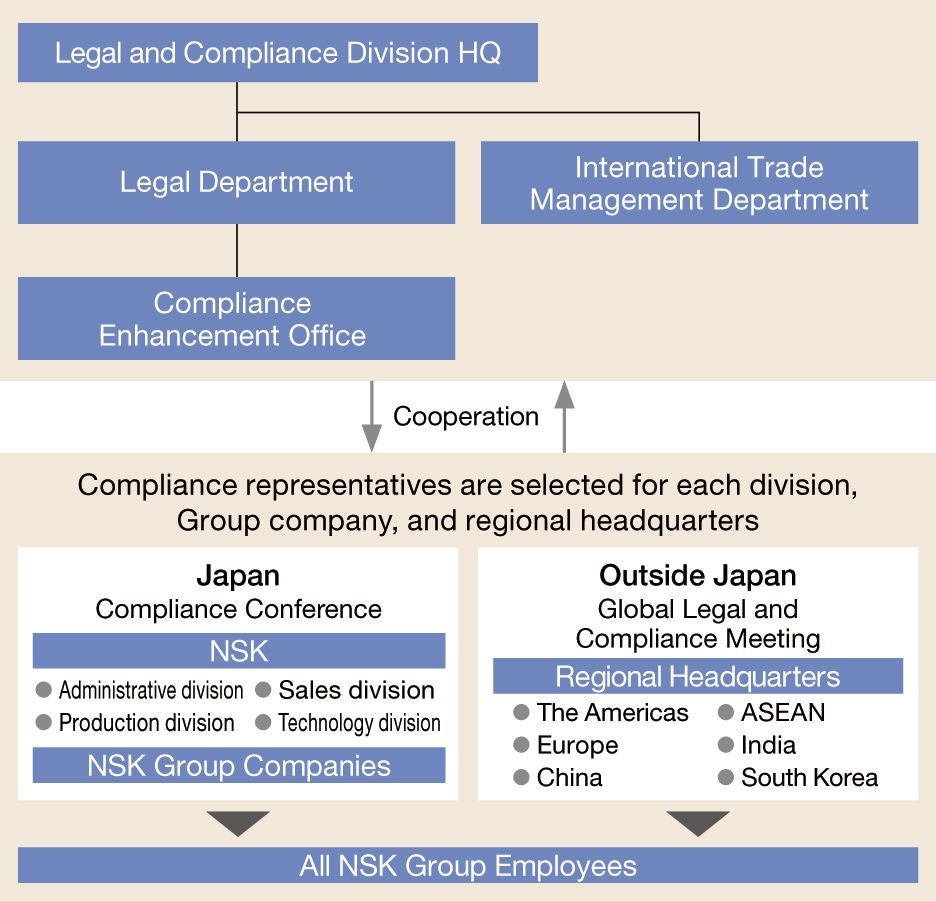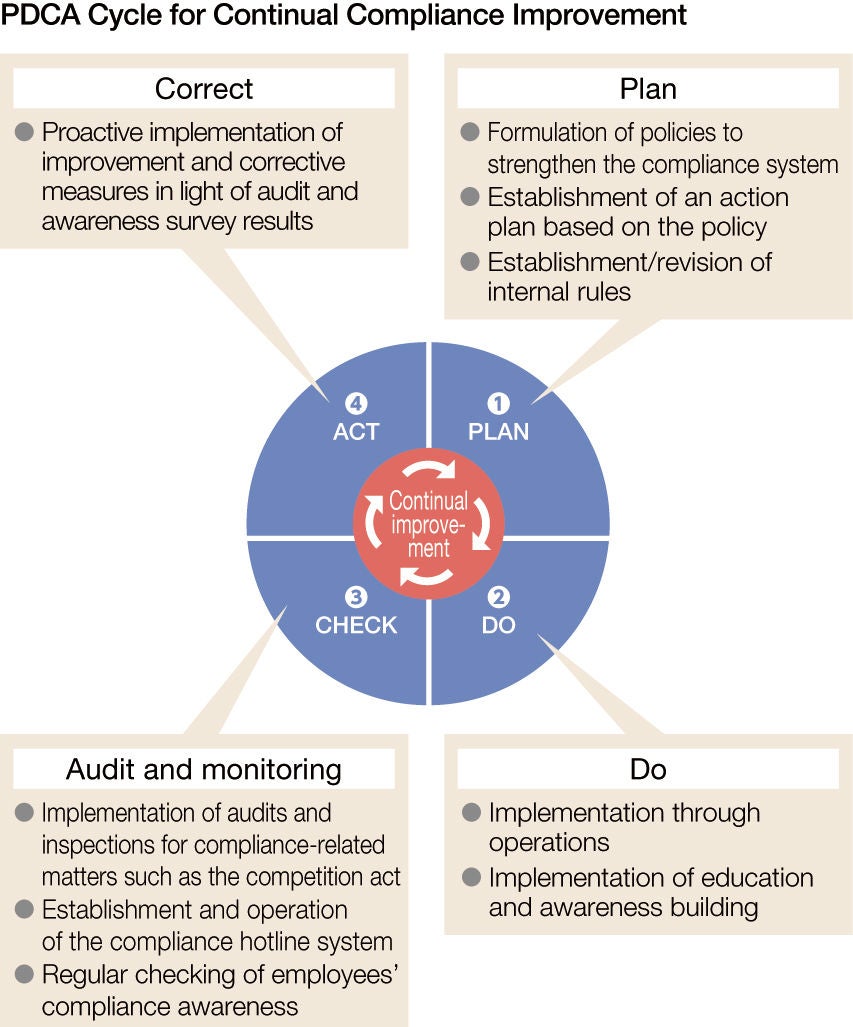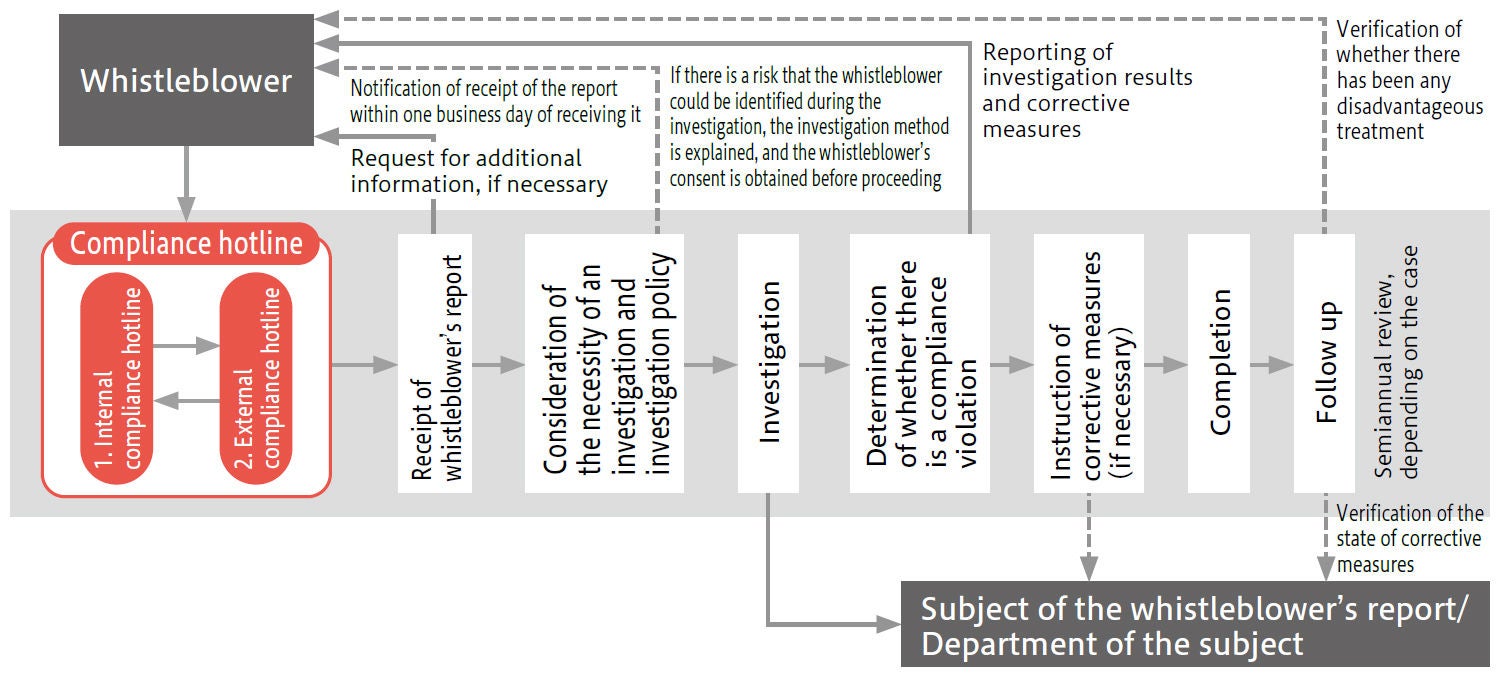Compliance
NSK’s Approach
The NSK Group has positioned compliance as one of its core values. For NSK, compliance goes beyond adherence to laws and regulations. It also entails acting in accordance with internal rules, social norms and the Corporate Philosophy in a sincere and fair manner. Moreover, compliance means earning the trust of society and contributing to the development of the economy and society in Japan and around the world.
◆NSK Code of Corporate Ethics (Established: February 22, 2002, Revised: April 1, 2022)
NSK Code of Corporate Ethics, based on the NSK Corporate Philosophy, lays down the fundamental principles that all officers and employees of NSK Ltd. and NSK Group companies (“Personnel”) shall comply with when conducting various business activities. All officers and employees of the NSK Group must follow this code. Whenever it is violated, the person concerned is subject to disciplinary action based on the employment regulations.
Scope: NSK Code of Corporate Ethics applies to NSK Ltd., its consolidated subsidiaries (unless they have established their own code independently), and NSK-Warner K.K.
[1] NSK Corporate Ethics Policies
- Personnel will strive to ensure that NSK Ltd. and its affiliates continue to prosper as a company that acts in a sincere and fair manner, and which is respected and trusted in international and regional society.
- Personnel will comply with all laws related to its business activities. Moreover, personnel will act in a highly ethical manner in order to ensure that NSK fulfils its responsibility as a corporate citizen.
[2] NSK Code of Conduct Concerning Compliance
- Compliance with Competition Laws
Personnel must not make agreements with competitors to set selling price or territorial sales markets, restrict resale price, or perform other anticompetitive acts. Personnel will conduct legitimate trade through free and fair market competition. - Compliance with Import- and Export-Related Laws
Compliance with international rules is essential for freedom of global business activities. Personnel must comply with all import- and export-related laws. - Prohibition of Commercial Bribery (handling of entertainment, gifts, etc.)
When giving and receiving gifts and entertainment, bribery — and any acts deviating from socially-accepted norms — is prohibited. Personnel must not provide entertainment and gifts to officials and employees of public institutions unless there are special reasons for doing so. - Transactions with Public Institutions and Handling of Political Donations
Personnel must comply with all laws related to transactions with public institutions. Personnel must also comply with all laws related to political donations and must avoid questionable expenditures/provision of benefits. - Accurate Recording and Processing
All business activities must be accurately recorded, archived, and processed appropriately in accordance with related laws and regulations. In the event of an audit, whether internal or external, personnel must cooperate fully and provide honest information. - Prohibition of Insider Trading
Personnel must not trade in stock or other securities with the knowledge of nonpublic insider information or provide said information to any third party, including family members. - Handling of Intellectual Property Rights
Personnel must strive to create, protect, and utilize intellectual property, such as inventions, and must handle intellectual property rights with great care. In addition, personnel must not infringe the intellectual property rights of others. - Prohibition of Illegal and Criminal Conduct
Personnel must adopt a resolute stance against illegal conduct and must not interact with organizations that are engaged in criminal operations. - Protection of Corporate Assets
Personnel must use corporate assets in an appropriate manner, solely for the purpose of corporate operations, and endeavor to protect such assets. Personnel must avoid the misuse and waste of corporate facilities, equipment, tools, materials, spare parts, and network systems. - Handling of Confidential and Personal Information
Personnel must not obtain confidential information of companies, customers, suppliers, etc. through wrongful means, disclose such information to any third party, nor use for private purposes, including after retirement. Personnel must also manage personal information appropriately in order to protect privacy. - Relations with Customers
Personnel must always provide high-quality, safe, and secure products and services. Personnel must always commit themselves to entering into fair trade practices, being sincere in attitude, and making proactive proposals in order to enhance trust in the NSK brand. - Relations with Suppliers
Selection of suppliers must be based on fair criteria. When conducting business with suppliers, personnel must comply with related laws and treat suppliers as an equal business partner. In addition, personnel shall not seek nor receive personal profits using a dominant bargaining position. - Prohibition of Acts Discrediting Competitors
Fair business activities must be performed based on the principles of free competition. Personnel must not unfairly undermine competitors’ credibility by disseminating arbitrary information about competitors or their products, including libel, slander, or defamation. - Prohibition of Discrimination, Cultivation of a Sound Workplace
Personnel must respect the rights of individuals and must not unfairly discriminate on the basis of race, appearance, belief, gender, lineage, ethnicity, nationality, age, marital status, physical disability, or other inappropriate reason. In addition, personnel must avoid engaging in acts that cause offense to the recipient. - Respect of Fundamental Rights at Work
Personnel must not use forced or child labor. In addition, personnel must comply with all labor laws and respect fundamental rights at work. - Global Environmental Protection
Personnel must comply with environment-related laws and internal rules. In addition, personnel must be conscious of the effect their work has on the environment, and strive to prevent pollution as well as protect human health and the ecosystem in order to pass on a better environment to the next generation.
[3] Disciplinary Actions
Personnel who violate this Code will be subjected to disciplinary actions.
System
◆Compliance Promotion System
The Legal and Compliance Division HQ formulates policies to strengthen the compliance structure of the NSK Group, implements various measure based on these policies, and continuously monitors the implementation status. Activities of the Legal and Compliance Division HQ are reported to the Core Values Committee on a regular basis. Through the discussion of policies for promoting and strengthening compliance, which is one of our core values, and sharing of relevant risks, the Core Values Committee makes recommendations and monitors progress toward resolving company-wide compliance issues.
The NSK Group has appointed persons responsible for compliance at each department, site, and NSK Group company in Japan as well as each headquarters outside Japan to serve as key contact points who regularly report on compliance and conduct risk management.
For more information on the Core Values Committee, please visit NSK Corporate Governance Structure.
◆Global Legal and Compliance Meetings
In order to strengthen the global compliance system, global legal and compliance meetings are held twice a year. At these meetings, members responsible for compliance from the Americas, Europe, China, ASEAN, India, and South Korea gather to report on and discuss compliance activities in their respective regions and countries. This includes compliance training implementation methods and compliance hotline operation. They also share information on relevant laws and regulations in each country, helping one another to identify ways to improve future performance.
NSK Group Compliance System


Targets and Performance
◆Mid-Term Management Plan 2026 (MTP2026) Targets, with Targets and Performance for Each Fiscal Year
| Policy | Increase trust from international and regional society by completely adhering to the laws and regulations, and by taking actions based on high ethical standards | ||
|---|---|---|---|
| MTP2026 | Targets |
|
|
| FY2023 | Targets |
|
|
| Performance |
|
| |
| FY2024 | Targets |
|
|
Creating Internal Regulations, Training and Awareness Raising Activities
◆Distribution of Compliance Guidebook
NSK created the NSK Compliance Guidebook that explains the 16 items of the NSK Code of Conduct Concerning Compliance, which is part of the NSK Code of Corporate Ethics. The Guidebook is written in the languages spoken by employees around the world and distributed to officers and employees of the NSK Group. We have prepared additional localized versions of the guidebook when needed, based on relevant national laws, in order to raise awareness of compliance. Employees who receive the Guidebook pledge to abide by its content.
◆Preventing Violations of the Competition Law
The NSK Group has established Rules for Compliance with Competition Law. We prohibit officers and employees from exchanging information or making arrangements with competitors regarding product prices or customers, or from making efforts to restrict sales price setting by retail stores. Moreover, contact with competitors is prohibited in principle. Whenever officers or employees need to participate in a business meeting where there is a chance for interaction with competitors, they must submit an application in advance followed by a report afterwards.
We also conduct training worldwide, focusing on sales departments annually. The training covers competition law and other compliance-related themes. The training includes the review of past cases of cartel behavior, in order to keep the applicable lessons fresh in employee minds.
◆Anti-bribery
The NSK Group’s Anti-Bribery Standards prohibit officers and employees not only from engaging in bribery, but also giving or receiving entertainment or gifts that deviate from publicly accepted norms. In principle, the provision of entertainment or gifts to any officer or employee of a public institution is prohibited.
Based on the Anti-Bribery Standards, localized internal regulations have been established for Group companies worldwide, based on relevant anti-bribery laws. The NSK Group regularly conducts training to prevent bribery.
◆Preventing Insider Trading
The Internal Regulation for Preventing Insider Trading applies to all officers and employees of the NSK Group. This regulation prohibits officers and employees from buying or selling company stock while in possession of insider knowledge of related undisclosed information. Personnel in this situation are also not allowed to encourage others including family members to buy or sell company stock. It also prohibits NSK Group officers and employees from purchasing NSK shares on the stock market. When selling NSK shares, they must apply for permission in advance using a special system. We are working to ensure thorough awareness of insider training across the Group. We provide e-learning modules and other training, posters, and internal communication materials such as the Compliance Newsletter.
◆Security Export Control
The NSK Group has strengthened its system for controls for preventing products and technology from being exported for the aims of the development, manufacture, and use of weapons, based on Japan’s Foreign Exchange and Foreign Trade Act. A basic policy and system of controls related to security export have been set forth in the Standards on Security Export Control. We are working to maintain and improve the reliability of the NSK Group’s export-related operations and to reduce the risk of legal violations by conducting e-learning sessions, specialized training, and regular audits.
◆Protecting Personal Information
The NSK Group maintains a basic policy concerning the acquisition, management and protection of personal information. Internal control systems have been set up for the protection of personal information based on the actual business situation. These enable the Group to collect, use, and provide personal information appropriately in accordance with its prescribed rules. We continually strive to prevent unauthorized access to personal information, as well as its leakage, loss, destruction, or falsification. This includes carefully supervising Group employees who process data containing personal information and any external provider contracted to do so.
◆No Association with Organized Crime
The NSK Group is fulfilling its corporate social responsibilities with a basic policy for completely blocking any association with organized crime, including transactional relationships. Furthermore, this policy is spelled out clearly in the NSK Code of Corporate Ethics and awareness of it is continually promoted to ensure a systematic response across the Group. We have also strengthened cooperation with the police and other external organizations. In Japan, the Group adds special clauses to its contracts with business partners to enable cancellation if the business partner is later found to be connected with organized crime.
◆Tax Compliance
As the globalization of business advances, the NSK Group believes that the proper payment of taxes in the countries and regions where it operates is one of the most fundamental and important social responsibilities that it should undertake. In March 2018, we established the NSK Group Tax Policy. We are striving to ensure appropriate tax treatment, including refraining from forming organizations that are inconsistent with business purposes and actual conditions for the purpose of tax avoidance.
◆Initiatives to Reduce Compliance Risks in Each Division
With the aim of reducing compliance risks in each division, the NSK Group conducts compliance training by department. The NSK Group also disseminates information via internal communication materials such as the Compliance Newsletter, otherwise known as the “Compliance Kawaraban,” with the aim of further raising compliance awareness among officers and employees. As a result of these training and awareness-raising activities, the percentage of favorable responses to compliance-related questions in engagement surveys improved from 59% in FY2019 to 72% in FY2023.
Training/Activities Conducted in FY2023
| Details | Subjects |
|---|---|
| Japan: Employees in all sales divisions |
| |
| Japan: Employees at nine production sites |
| Japan: Employees in all technical departments |
| Japan: All employees |
◆NSK Corporate Philosophy Day
To revisit the lessons learned from past incidents, reconfirm the resolve of all NSK Group employees that no anticompetitive incident will ever occur again, and ensure that all employees review the Corporate Philosophy and make it their own code of conduct, July 26, the date of our on-site inspection by the Japan Fair Trade Commission, has been designated as “NSK Corporate Philosophy Day.”
In FY2023, a message from the president was delivered to locations in Japan and other countries, and employees watched a video about the cartel incident and an explanation of NSK’s Corporate Philosophy. In Japan, initiatives were introduced to foster a workplace culture that embodies “Beyond Limits, Beyond Today,” our action guidelines for realizing the Corporate Philosophy. Overseas, after a message from the management of local bases, each site held its own events that included lectures by outside experts and discussions on compliance.
Monitoring
◆Employee Engagement Surveys (Compliance Awareness Surveys)
An employee engagement survey is conducted with the Human Resources Department. The objective is to assess the level of compliance awareness and the condition of work environments, in terms of motivation and opportunities for growth for each employee. We are working to address issues identified based on employee engagement surveys. These activities include raising compliance awareness in the manufacturing division, while further improving the compliance hotline’s reliability.
◆Auditing and Inspection
Since FY2013, the Compliance Enhancement Office in NSK’s Legal Department has been conducting annual audits to assess the extent of compliance with competition law. We also use self-inspections to check for risks relating to specific compliance topics.
Points for adherence to the NSK Code of Corporate Ethics are reviewed annually under the group-wide Enterprise Risk Management (ERM) framework.
◆Compliance Hotline (Whistleblowing System)
The NSK Group has made explicit in its internal rules that employees who learn of acts that violate or might violate the NSK Code of Corporate Ethics or compliance are to contact the compliance hotline made available in their regions and countries. The Group makes sure that employees are well informed about these hotlines. In some countries and regions, the hotline is available to suppliers, as well.
In Japan, we established hotline operational rules to ensure that the functioning of our system is in full compliance with Japan’s Whistleblower Protection Act. We have also set up internal and external hotlines, which accept reports 24 hours a day. The system allows hotline users to remain anonymous, and rules are established to ensure they are protected from disadvantageous repercussions. Reported incidents are investigated by the Legal and Compliance Division Headquarters in Japan and by the local legal department outside Japan with the help of relevant departments as needed. If a compliance violation becomes apparent, corrective actions and recurrence prevention measures are quickly taken where needed.
We are distributing business card-sized cards containing the hotline contact information to make the system well known to employees. In addition, we disclose the number of reports and the status of measures taken in response to reported incidents via internal corporate communication tools, helping to form a corporate culture that ensures employees can use the system with peace of mind. In FY2023, 131 reports were received globally.

